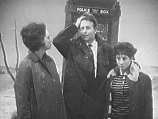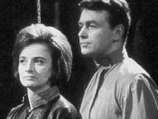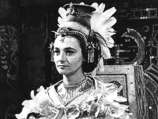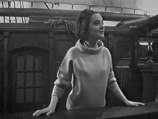|
|
 |
|
Barbara
Wright
(1963 - 1965) |
|
Jacqueline
Hill |
|
Born in 1929 Jacqueline Hill
had set her heart on acting at an early age and was
able to secure a place at the Royal Academy of Dramatic
Art (RADA). On graduating she played a number of parts
in theatre, television and films including, alongside
Sean Connery, in one of ABC's television Armchair
Theatre plays. On leaving Doctor Who she
spent time with her family and only returned to television
in the late seventies appearing in Tales of the
Unexpected and also returning to Doctor Who as
the high priestess Lexa in the 1980 story "Meglos".
Unfortunately, Jacqueline Hill died in 1993.
|
|
|
|
 Barbara
Wright was a history teacher at Coal Hill School. It was her
curiosity about her strange pupil Susan that
made her persuade fellow schoolteacher Ian
Chesterton to investigate her home and her mysterious grandfather.
Even though she agreed with Ian that they should not follow
her home but the fact that Susan was such a mystery meant that
she could not stop herself. Barbara
Wright was a history teacher at Coal Hill School. It was her
curiosity about her strange pupil Susan that
made her persuade fellow schoolteacher Ian
Chesterton to investigate her home and her mysterious grandfather.
Even though she agreed with Ian that they should not follow
her home but the fact that Susan was such a mystery meant that
she could not stop herself.
 |
| An Unearthly Child |
|
 Like
Ian she could not believe her eyes when they enter the TARDIS and
find that the room they are in is much larger than the police
telephone box they had just entered. At first she was too
concerned for Susan to take it all in. Like Ian Barbara found
it hard to believe The Doctor and
Susan's explanation of the TARDIS and she was convinced that
it is all part of Susan's wild imagination. 'Can't you
see that all this is an illusion. It's a game that you and
your
grandfather are playing, if you like, but you can't expect
us to believe it'. She was able to get over the initial shock
of being captured and transported in the TARDIS much more
quickly than Ian was and she was able to come to terms with
her predicament a lot faster. Along with Ian she too at first
did not trust The Doctor especially when Ian gets an electric
shock from a booby trapped console which The Doctor uses
to prevent him from opening the TARDIS doors and allowing
them both to escape ("An
Unearthly Child"). Like
Ian she could not believe her eyes when they enter the TARDIS and
find that the room they are in is much larger than the police
telephone box they had just entered. At first she was too
concerned for Susan to take it all in. Like Ian Barbara found
it hard to believe The Doctor and
Susan's explanation of the TARDIS and she was convinced that
it is all part of Susan's wild imagination. 'Can't you
see that all this is an illusion. It's a game that you and
your
grandfather are playing, if you like, but you can't expect
us to believe it'. She was able to get over the initial shock
of being captured and transported in the TARDIS much more
quickly than Ian was and she was able to come to terms with
her predicament a lot faster. Along with Ian she too at first
did not trust The Doctor especially when Ian gets an electric
shock from a booby trapped console which The Doctor uses
to prevent him from opening the TARDIS doors and allowing
them both to escape ("An
Unearthly Child").
 Barbara
did find The Doctor annoying at times, especially when he had proved
himself wrong and was never slow to tell him so. However, she soon
mellowed to The Doctor and like Ian started to enjoy travelling
to exotic places and times. She had a fairly open mind and was able
to accept the situations that she found herself in, as seen most
notably when she learned that the TARDIS crew changed history every
time they left the ship - rather than The Doctor’s initial
claims that it was impossible to alter history - recognising that
The Doctor avoided altering the original outcome of events because
it made everything too complicated ("The
Time Travellers"). Barbara
did find The Doctor annoying at times, especially when he had proved
himself wrong and was never slow to tell him so. However, she soon
mellowed to The Doctor and like Ian started to enjoy travelling
to exotic places and times. She had a fairly open mind and was able
to accept the situations that she found herself in, as seen most
notably when she learned that the TARDIS crew changed history every
time they left the ship - rather than The Doctor’s initial
claims that it was impossible to alter history - recognising that
The Doctor avoided altering the original outcome of events because
it made everything too complicated ("The
Time Travellers").
 |
| Marco Polo |
|
 Barbara
was by no means the glamorous, mini-skirted screamer that was to
become the main role of the female companions of later years. One
thing Barbara could always be sure of, though, was the close companionship
she had with Ian. It seemed almost certain that Ian and Barbara
were made for each other but there was never any sign of any romance
between the two of them in the television series (Although Barbara
recognised her feelings for Ian after witnessing the death of an
alternate version of him created by a flawed time travel experiment
("The Time Travellers"), later asking Ian to marry her
when they returned home ("The
Eleventh Tiger")). She also
had a very compassionate nature and looked out for Susan and was
a tower of strength to her. She also was immediately kind to the
orphaned Vicki.
(Although their relationship suffered a brief setback when Barbara
killed Vicki’s pet sand-beast in the belief that it was a
dangerous animal). She became a combination of mother and big sister
to them both, even once posing as Susan’s mother during a
brief stay in 1692 ("The
Witch Hunters"). Although she
would always offer Susan or Vicki some support, such as when she
and Susan were used as cheap labour by a group secretly constructing
a spaceship to escape a dying world ("City
at World's End") or when she and Vicki were held hostage by a deranged
monk who had been programmed with the memories of the First Emperor
of China by The
Mandragora Helix ("The Eleventh Tiger"),
she would always turn to Ian for her own protection. Barbara
was by no means the glamorous, mini-skirted screamer that was to
become the main role of the female companions of later years. One
thing Barbara could always be sure of, though, was the close companionship
she had with Ian. It seemed almost certain that Ian and Barbara
were made for each other but there was never any sign of any romance
between the two of them in the television series (Although Barbara
recognised her feelings for Ian after witnessing the death of an
alternate version of him created by a flawed time travel experiment
("The Time Travellers"), later asking Ian to marry her
when they returned home ("The
Eleventh Tiger")). She also
had a very compassionate nature and looked out for Susan and was
a tower of strength to her. She also was immediately kind to the
orphaned Vicki.
(Although their relationship suffered a brief setback when Barbara
killed Vicki’s pet sand-beast in the belief that it was a
dangerous animal). She became a combination of mother and big sister
to them both, even once posing as Susan’s mother during a
brief stay in 1692 ("The
Witch Hunters"). Although she
would always offer Susan or Vicki some support, such as when she
and Susan were used as cheap labour by a group secretly constructing
a spaceship to escape a dying world ("City
at World's End") or when she and Vicki were held hostage by a deranged
monk who had been programmed with the memories of the First Emperor
of China by The
Mandragora Helix ("The Eleventh Tiger"),
she would always turn to Ian for her own protection.
 |
| The Aztecs |
|
 Her
outer calmness belied an inner strength, as seen most prominently
when the rest of the TARDIS crew were hypnotised by the disembodied
brains controlling the city of Morphoton on the planet Marinus,
leaving Barbara to single-handedly destroy the brains’ life-support
systems ("The
Keys of Marinus"), or when she alone managed
to destroy the powerful Animus - one of the Great Old Ones - using
The Doctor’s Isop-Tope device ("The
Web Planet").
Her soft and calm tones became indispensable during the frequent
times of tension that they were all faced with, although she wasn’t
afraid to shout when required, once berating The Doctor for not
appearing to register that she and Ian were their own people after
Susan’s departure ("Venusian
Lullaby"). Barbara
was practical; she demonstrated great maturity and most of the time
she could be relied on for her common sense. She could be sensitive
and thoughtful but also argumentative and sullen, most notably when
arguing with The Doctor when she tried to encourage changes to Aztec
culture ("The
Aztecs") or when she believed that Ian had
been killed (Although the dead Ian was later revealed to be an alternate
Ian created by a flawed time-travelling experiment) ("The Time
Travellers"). Also Barbara wasn't averse to a bit of fun, enjoying
their brief ‘holiday’ in a Roman villa ("The
Romans")
(Although this was preceded by the crew becoming separated and each
believing the others to be dead ("Byzantium!")). Her
outer calmness belied an inner strength, as seen most prominently
when the rest of the TARDIS crew were hypnotised by the disembodied
brains controlling the city of Morphoton on the planet Marinus,
leaving Barbara to single-handedly destroy the brains’ life-support
systems ("The
Keys of Marinus"), or when she alone managed
to destroy the powerful Animus - one of the Great Old Ones - using
The Doctor’s Isop-Tope device ("The
Web Planet").
Her soft and calm tones became indispensable during the frequent
times of tension that they were all faced with, although she wasn’t
afraid to shout when required, once berating The Doctor for not
appearing to register that she and Ian were their own people after
Susan’s departure ("Venusian
Lullaby"). Barbara
was practical; she demonstrated great maturity and most of the time
she could be relied on for her common sense. She could be sensitive
and thoughtful but also argumentative and sullen, most notably when
arguing with The Doctor when she tried to encourage changes to Aztec
culture ("The
Aztecs") or when she believed that Ian had
been killed (Although the dead Ian was later revealed to be an alternate
Ian created by a flawed time-travelling experiment) ("The Time
Travellers"). Also Barbara wasn't averse to a bit of fun, enjoying
their brief ‘holiday’ in a Roman villa ("The
Romans")
(Although this was preceded by the crew becoming separated and each
believing the others to be dead ("Byzantium!")).
 |
| The Chase |
|
 She
however, did find it difficult at times not to get involved
and to try and change history for the better. This is well
demonstrated in the story "The
Aztecs" where The Doctor tells her 'You can't rewrite
history. Not one line! Barbara one last appeal: what you
are trying to do is utterly impossible. I know! Believe
me, I know!', although she later accepted The Doctor’s
reasons for lying when he revealed that he could change
history but chose not to in order to avoid complications.
Being a history teacher served her well during the historic
adventures and a number of times she relished in the opportunity
to meet characters that she had only read and taught about.
This was clearly demonstrated in "Marco Polo" where
she enjoyed meeting the great explorer during his trek across
China; she even received a gold bracelet from Emperor Nero
during a trip to Rome ("The Romans"), although
she lost it during their trip to Vortis when the Animus
used it to control her mind ("The Web Planet"). She
however, did find it difficult at times not to get involved
and to try and change history for the better. This is well
demonstrated in the story "The
Aztecs" where The Doctor tells her 'You can't rewrite
history. Not one line! Barbara one last appeal: what you
are trying to do is utterly impossible. I know! Believe
me, I know!', although she later accepted The Doctor’s
reasons for lying when he revealed that he could change
history but chose not to in order to avoid complications.
Being a history teacher served her well during the historic
adventures and a number of times she relished in the opportunity
to meet characters that she had only read and taught about.
This was clearly demonstrated in "Marco Polo" where
she enjoyed meeting the great explorer during his trek across
China; she even received a gold bracelet from Emperor Nero
during a trip to Rome ("The Romans"), although
she lost it during their trip to Vortis when the Animus
used it to control her mind ("The Web Planet").
 Even
so despite the many varied locations the TARDIS took her
to, like Ian, Barbara took advantage of a Dalek time
machine and persuaded The Doctor to make it possible for
them to use it to return home to 20th century London. Despite
arriving back two years after she had left Barbara was just
relieved to be back in familiar surroundings again ("The
Chase"). Shortly after their return to Earth, Ian and Barbara were abducted by an alien race and trapped in a psychic prison that reverted them back to just before they left Coal Hill School to follow Susan, until they were rescued by the Eleventh Doctor after their prison’s psychic energy caused chaos on a ship that he had just landed on ("Hunters of the Burning Stone"). Even
so despite the many varied locations the TARDIS took her
to, like Ian, Barbara took advantage of a Dalek time
machine and persuaded The Doctor to make it possible for
them to use it to return home to 20th century London. Despite
arriving back two years after she had left Barbara was just
relieved to be back in familiar surroundings again ("The
Chase"). Shortly after their return to Earth, Ian and Barbara were abducted by an alien race and trapped in a psychic prison that reverted them back to just before they left Coal Hill School to follow Susan, until they were rescued by the Eleventh Doctor after their prison’s psychic energy caused chaos on a ship that he had just landed on ("Hunters of the Burning Stone").
 |
Matrix
(Robert Perry & Mike
Tucker) |
|
Although Barbara was briefly held hostage by their enemies, the two joined The Doctor in investigating the origins of their psychic prison and the metal that made it, eventually learning that a race known as the Prometheans had abducted Ian and Barbara due to their role in influencing the Tribe of Gum ("An Unearthly Child" aka "100 000 BC"), the Prometheans attempting to establish themselves as gods before the TARDIS crew inspired the Tribe of Gum to seek their own destiny. With The Doctor having used the Prometheans’ equipment to impose mental barriers on humanity that would prevent the Prometheans influencing them, using the TARDIS as a protective image in the human subconscious, he took Ian and Barbara home, subsequently serving as Ian’s best man at their wedding, assuring his first companions that he valued his time with them as they had helped him become a better person, citing such moments as Ian’s compassion for a caveman when The Doctor had been willing to kill him.
 Ian and Barbara were later indirectly
reunited with The Doctor when Ian was hired by UNIT to serve
as a substitute scientific advisor while the Third
Doctor was away ("The
Face of the Enemy"), where it was
revealed that Barbara had gone on to become a university
lecturer specialising in Aztec culture. The Seventh
Doctor and Ace encountered alternate versions of Ian and Barbara
during their brief arrival in an alternate 1963 where the
actions of The
Valeyard had released the Dark Matrix upon
Earth, the alternate Barbara helping The Doctor track down
the point where history had diverged before his departure
("Matrix"). Ian and Barbara were later indirectly
reunited with The Doctor when Ian was hired by UNIT to serve
as a substitute scientific advisor while the Third
Doctor was away ("The
Face of the Enemy"), where it was
revealed that Barbara had gone on to become a university
lecturer specialising in Aztec culture. The Seventh
Doctor and Ace encountered alternate versions of Ian and Barbara
during their brief arrival in an alternate 1963 where the
actions of The
Valeyard had released the Dark Matrix upon
Earth, the alternate Barbara helping The Doctor track down
the point where history had diverged before his departure
("Matrix").
 In "Death of The Doctor" - an episode of spin-off
series The Sarah
Jane Adventures, looking at the modern
adventures of the Third and Fourth
Doctor’s companion Sarah
Jane Smith -, Sarah Jane mentioned that her research
into other companions had included reference to Ian and
Barbara as professors at Cambridge, rumours saying that
they hadn’t aged a day since the sixties, although this likely just refers to them still appearing 'young at heart' as Ian has clearly aged when he returns to action. On one occasion, Ian was captured by Pendolin, an entity who fed on the memories of time travellers and wanted to use Ian as bait to lure in The Doctor, but he was able to hold on to his memories of his love for Barbara, until he found another time machine that would allow him to return home. Later, while Barbara was out shopping, Ian's aid was requested by the Time Lords to help Susan negotiate an alliance with the Sensorites, the Time Lords returning Ian to his kitchen just as Barbara returned home herself after the negotiations had concluded. In "Death of The Doctor" - an episode of spin-off
series The Sarah
Jane Adventures, looking at the modern
adventures of the Third and Fourth
Doctor’s companion Sarah
Jane Smith -, Sarah Jane mentioned that her research
into other companions had included reference to Ian and
Barbara as professors at Cambridge, rumours saying that
they hadn’t aged a day since the sixties, although this likely just refers to them still appearing 'young at heart' as Ian has clearly aged when he returns to action. On one occasion, Ian was captured by Pendolin, an entity who fed on the memories of time travellers and wanted to use Ian as bait to lure in The Doctor, but he was able to hold on to his memories of his love for Barbara, until he found another time machine that would allow him to return home. Later, while Barbara was out shopping, Ian's aid was requested by the Time Lords to help Susan negotiate an alliance with the Sensorites, the Time Lords returning Ian to his kitchen just as Barbara returned home herself after the negotiations had concluded. |